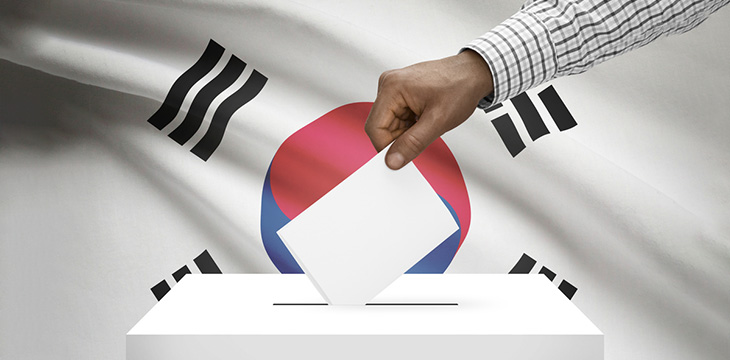|
Getting your Trinity Audio player ready...
|
South Korea has unveiled plans to establish an online voting system using blockchain as part of its plans to be a leader in the industry.
The announcement from the Ministry of Science and ICT tilted to blockchain for the online voting system because of its inherent characteristics of transparency and immutability. The Ministry noted that eliminating third parties and intermediaries would improve the electioneering process in the country.
Using a blockchain-based online voting system, authorities can store the results of elections in the country without the fear of manipulation by bad actors. The move to use distributed ledgers in elections stems from the overhauling process that the country’s voting system is undergoing.
South Korea has been experimenting with online voting since 2013, but it has been limited to elections in educational institutions and certain positions in political parties. However, the country approved an electronic referendum last month, and the process might use the proposed blockchain-based e-voting system.
“We are now working to improve the blockchain voting system, spending 1.5 billion won ($1.1 million) for this year,” said the Ministry’s press release. “And we will expand the amount in 2023.”
Aside from the launch of blockchain voting processes, lawmakers are mulling over the creation of an online platform to store the academic records of citizens. The plan will leverage blockchain to improve the ease of authenticating job seekers’ educational qualifications to reduce fraud. Not resting on its oars, the South Korean government says the emerging technology will also be used in running its subsidy management scheme.
AnonSurvey, a blockchain e-voting app, was launched using the BSV blockchain as its backend, allowing users to cast votes or respond to questionnaires while maintaining privacy.
Eli Afram, owner and developer of AnonSurvey, tells CoinGeek: “I think it’s great that South Korea is paving the way and showing other countries how to create transparency in government. It’s exactly what I have been advocating for the last couple years with AnonSurvey. Transparency is a key ingredient for fair elections and what better platform to offer it than a public blockchain? There’s no need to spend millions of dollars though, AnonSurvey is already built and can offer governments and organisations the ability to vote on chain for a fraction of the cost elsewhere.”
South Korea’s renewed vigor
South Korea has emerged as the leader in blockchain adoption in Southeast Asia, and a large chunk of the adoption stems from its new government. The country swore in a new president, Yoon Suk-yeol, an avid digital asset enthusiast that promised sweeping changes.
True to his word, the president has introduced several changes in the sector, such as postponing the 20% tax on digital currencies to 2025. Furthermore, the country has unveiled a number of funds to support the metaverse development, but Terra’s collapse has dulled its enthusiasm.
Since the collapse, digital asset exchanges have increasingly come under the crosshairs of South Korean law enforcement agencies, while traders hope that the grim chapter comes to an end.
Watch: Why using transparent ledger for digital identity ensures trust

 02-20-2026
02-20-2026 




